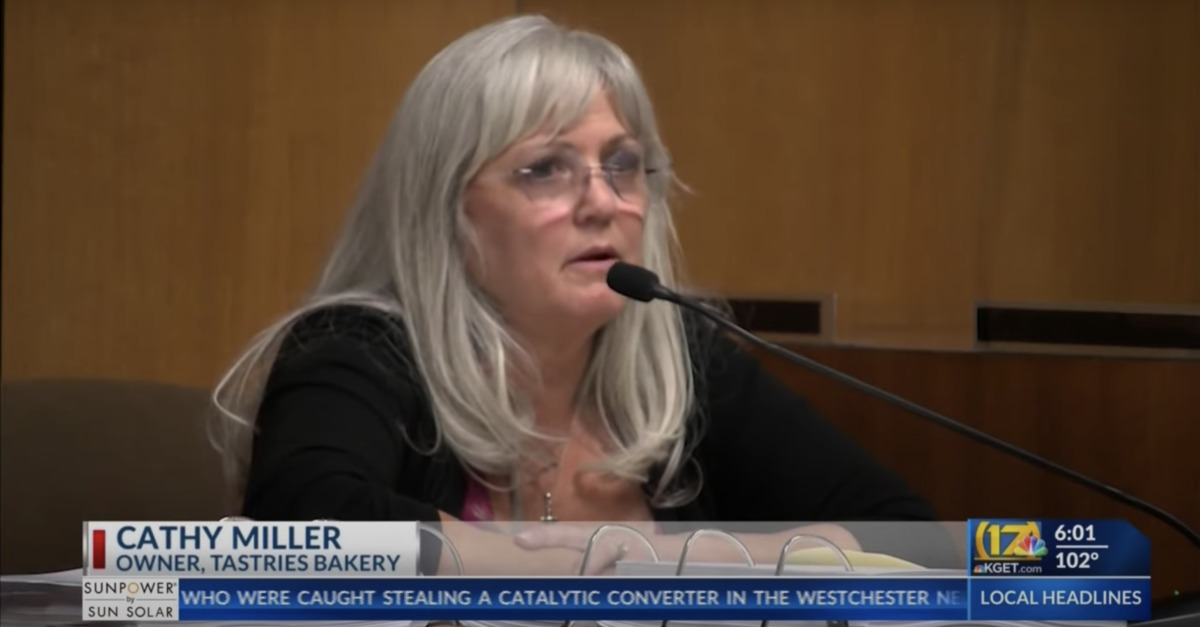
A Christian bakery owner in California won a First Amendment victory in state court late last week after refusing to bake a vow-renewal and marriage-celebration cake for a lesbian couple because of her religious belief that marriage “is between a man and a woman.”
Cathy Miller runs Tastries, a bakery, boutique, and deli, in Bakersfield, Calif. The 25-page decision in her favor by Kern County Superior Court Judge Eric Bradshaw explains the business is specifically Christian-oriented and contains “Christian symbols and messages, such as crosses and Bible verses” and “openly displays and sells such items.”
Moreover, the opinion notes, Miller “discusses the meaning and religious significance of a wedding cake” during design consultations with potential clients and takes at least some part in the creation of each and every wedding-themed cake that her bakery sells.
“Miller has established written design standards for all custom bakery items,” the opinion says. “The standards are rooted in Miller’s Christian beliefs, which are in turn rooted in the Bible, and have evolved in response to Miller’s experiences with peoples’ custom orders.”
Generally, those standards preclude the bakery from producing anything that goes beyond “PG or G” Motion Picture Association of America ratings, the employee handbook says, including any alcohol-related content, drug-related content, violent content, sexual content, “gore, witches, spirits, and satanic or demonic content,” and, relevant here, any designs that “violate fundamental Christian principals [sic].” The standards explicitly say: “wedding cakes must not contradict God’s sacrament of marriage between a man and a woman.”
In 2017, Eileen Rodriguez-del Rio and Mireya Rodriguez-del Rio visited Tastries and were, at first, led to believe that the bakery would accommodate their needs. As the opinion explains, not all of Miller’s employees follow all of the design standards all of the time – they occasionally go behind her back to create cakes that violate the rules. A same-sex marriage cake has even been produced by the bakery before, the court came to learn during discovery and a trial.
But that didn’t particularly matter – at least not legally.
After Miller eventually came to realize the nature of the custom order from the Rodriguez-del Rios during a follow-up cake-tasting mired in confusion, the proprietor of the Christian shop prayed – in front of the couple and their two male friends – and then explained that she could not fulfill the request. The baker did, however, refer the couple to another bakery with whom she has an “oral agreement” for all custom cake orders that violate her design standards.
The Rodriguez-del Rios declined the offer. They had already ruled out the other bakery because they found the cakes too sweet. A contentious reckoning on social media ensued for both parties, the opinion notes.
Later, the Department of Fair Employment and Housing sued Miller and her business for violating the Golden State’s Unruh Civil Rights Act, which forbids any form of business discrimination on the basis of sexual orientation and provides for various damages if a business is found to have made “any discrimination or distinction contrary” to the civil rights law.
Using a First Amendment analysis, the court found that the creation of a wedding cake qualifies as “pure speech,” the form of speech that the U.S. Constitution afford the utmost protection.
“DFEH seems to compel defendants to celebrate same-sex weddings,” Bradshaw writes, which changes the content of defendants’ desired expressive conduct. DFEH also seeks to require defendants to create wedding cakes celebrating same-sex weddings because they design and create wedding cakes for traditional, opposite-sex weddings. It is only because Miller and Tastries design wedding cakes celebrating marriage between a man and a woman that DFEH seeks to compel the defendants to convey a different message celebrating same-sex marriage.”
Government-compelled speech, under longstanding Supreme Court precedent, almost always violates the First Amendment.
Additionally, the court found that wedding cake-making is a form of expressive speech, which conveys “a particular message of support for the marriage that is very likely to be understood by those who view it.” And, in this case, forcing Miller to make a cake for a same-sex marriage celebration would compelling her to speak and make a “message of support for a marriage” that she disagrees with.
“Defendants’ pure and expressive speech is entitled to protection under the First Amendment,” the court concluded. “DFEH’s enforcement action seeks to compel Miller and Tastries to express support for same-sex marriage, or be silent. No compelling state interest justifies such a result under strict scrutiny.”
Notably, while the court did not decide the case against the baker and reached a verdict in her favor on the basis of the First Amendments’s free speech guarantee, the judge penned a discussion of her free exercise of religion claim but found, in order to “complete the trial record,” that this defense would fail under California law.
[image via screengrab/KGET]